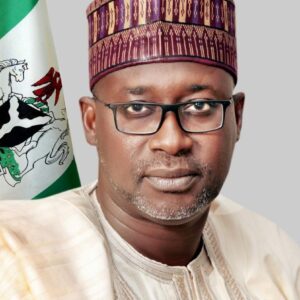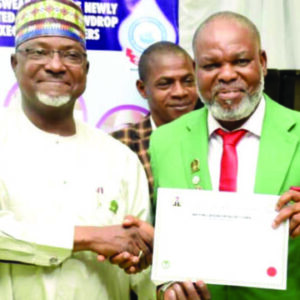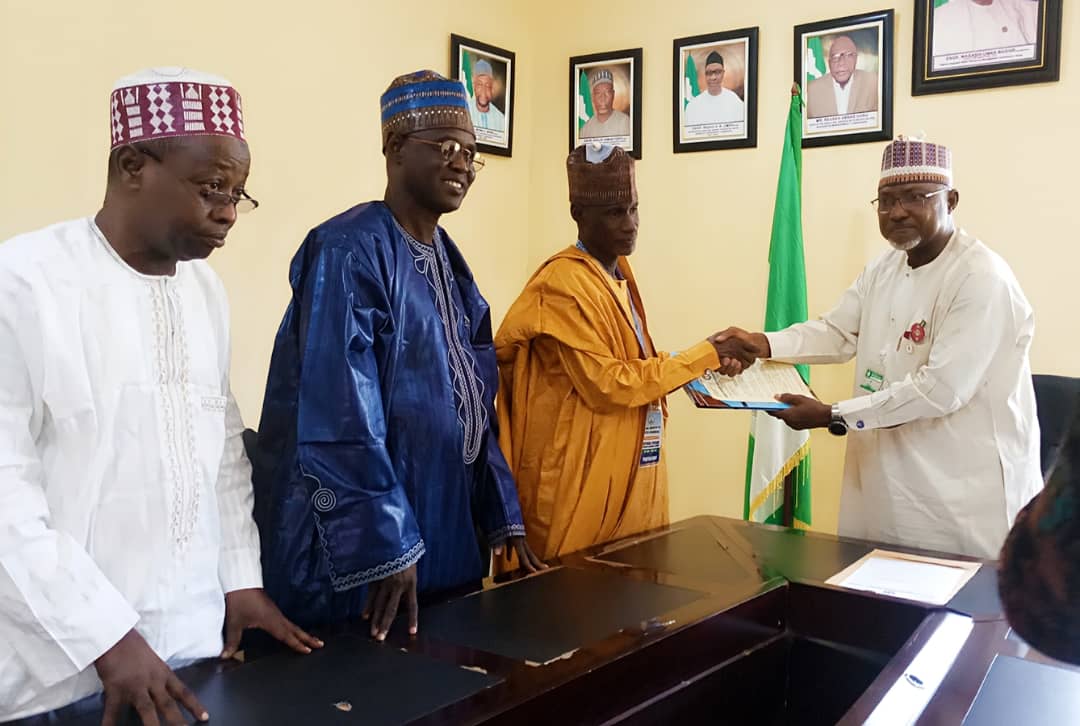“Nigeria has greater challenges when it comes to water development and management. The current water resources development and supply status is unacceptably low and needs a major transformation. With the rapid growth in population, urbanization, industrialization and competition for economic development, water resource has become vulnerable to depletion and degradation”

Water remains an indelible part of human existence and managing it for public good is a huge responsibility. Having been appointed just before the Coronavirus pandemic hit, Engr. Magashi Umar Bashir, Executive Director of Nigeria’s Integrated Water Resources Management Commission, NIWRMC was thrown into the deep end.
On acknowledging his first year in office, Engr Magashi, in this exclusive chat with Environment Africa Magazine team, recounts the pressing issues that have been challenges to water resources management in Nigeria.
Excerpts:
What has been your experience since assuming office?
When I came in, it was discovered we were still using an outdated regulation, the 2016 water use license. So we wrote to the minister and had the 2020 water use license approved. We looked at the ongoing operations and processes to restructure them. There were things that we felt were going well and we continued those.
One of them is the water source project to protect all sources of water in the country against pollution or external aggression. This is by individuals within the country or any other person from outside.
Contrarily, we also found that we had to produce both legal and policy frameworks to support the commissions operations and we have been able to produce these. Even during the covid-19 lockdown period, we wrote to all stakeholders to make their submissions, which they did, and we filed this together. We are looking at next year, for a larger stakeholder gathering, to present these findings and come out with concrete undertakings for the nation.
How strong is the commission on Monitoring and Evaluation?
We are having a lot of problems with companies refusing to pay Government what is due. I believe there’s no country anywhere in this world that you establish a large water business for a brewery or construction company and you take water from the surface or underground aquifer without any license or permission to do so without giving the Government a dime.
So you can’t come into Nigeria, and just set up without doing what is right. We have a lot of companies producing bottled water for instance. They don’t care about paying for permits, all the money they make they take outside the country.
Of course, we can see that revenue generation is reducing; even in the oil sector, but the water sector is there to provide a helping hand for Government to generate some good revenue and we are positioned to ensure these from water licenses.

What are the specific benefits for Water use beyond licensing?
We need to conserve the water that we have. It’s about pollution, it’s about protecting the sources of water and making such water available. It’s about trying to find renewable places where we can recharge the aquifers that we have, both on the surface and on ground. So this is about having very clean water that can serve future generations.
We have several other bodies collecting water rates and issuing licenses. Why the duplication?
Only NIWRMC is mandated to collect water rates and give out water use licenses. No other body in the country has that right. There are actually a lot of things that are not been done well that need to be resolved. And quite a few organizations have taken advantage of several loopholes to exploit the situation.
So, only the Federal Ministry of Water Resources through the Water Resources Management Commission has the mandate to issue licenses for water use; irrespective of the industry or sector.
How about other agencies that collect such rates and wont this send wrong signals?
I think it was because of existing loopholes that allowed that but all those are being resolved. NIWA for instance is mostly into inland waterways and transportation. Collecting water use tax is not within their mandate.
But you also need to understand that Government works in such a way that there will be collaborations. There is nothing like a perfect bill where all powers are given to one agency or commission, which will make them all powerful and they can do whatever they want. There will be areas of collaboration, and we can meet with other government organizations, sign M.O.U’s with them and work with each other.
In the Oil and Gas Sector and maritime industry; once you take transboundary waters, then you’ll find us at your door. In the extractives industry, mining, we also are there to ensure that water rates are paid.
And we don’t just leave it there. We collaborate and network with other agencies to ensure that these waters are not polluted or abused for future use and future generations.







Still confused on the difference between Cash and Forex but?
This is a topic that is close to my heart…Take care! Where are your contact details though?
I think that everything posted made a bunch of sense.But, what about this? what if you added a little content?I mean, I don’t want to tell you how to run your blog, but suppose you added something that makes people desire more?I mean ENTREVISTA A CLARA S. PROUS (MURALISTES) | FEMART is a little vanilla.You ought to look at Yahoo’s home page andsee how they create news titles to grab viewers to click.You might add a related video or a pic or twoto get people interested about what you’ve got to say.Just my opinion, it could bring your posts a little livelier.
I don’t think the title of your article matches the content lol. Just kidding, mainly because I had some doubts after reading the article.
Can you be more specific about the content of your article? After reading it, I still have some doubts. Hope you can help me.
Amazing Post Broo!! Amazing Amazing!! Wait Your New Post Bro!!
This is really interesting, You are a very skilled blogger. I have joined your feed and look forward to seeking more of your fantastic post. Also, I have shared your web site in my social networks!
Hello there! Do you use Twitter? I’d like to follow you if that would be okay. I’m absolutely enjoying your blog and look forward to new updates.
Almost all of the things you say happens to be astonishingly legitimate and it makes me wonder why I hadn’t looked at this with this light previously. This article really did switch the light on for me personally as far as this issue goes. Nevertheless at this time there is actually one particular factor I am not necessarily too comfy with and while I try to reconcile that with the core idea of your issue, let me observe just what the rest of the subscribers have to point out.Well done.
Excellent website right here! Additionally your website starts up very fast! What host are you using? Can you pass along your affiliate hyperlink to your host? I desire my site loaded up as quickly as yours lol
If you want to increase your knowledge just keep visiting this web page and be updated with the newest news posted here.
Heya i’m for the first time here. I came across this board andI find It truly useful & it helped me out a lot.I’m hoping to present something back and aid others like you aided me.
Great post. I was checking continuously this weblog and I’m inspired! Extremely useful information particularly the ultimate part 🙂 I take care of such info much. I used to be looking for this certain information for a very lengthy time. Thank you and best of luck.
As the monetary system rebounds and other people turn to investment alternatives once more, a brand new demand for knowledge and technique has began to emerge.
You made some clear points there. I looked on the internet for the subject and found most people will go along with with your website.
|Hello to all, for the reason that I am actually keen of
Can you be more specific about the content of your article? After reading it, I still have some doubts. Hope you can help me.
Stay ahead of the curve in the Iraqi marketplace with Businessiraq.com. This invaluable online resource is your complete guide to the Iraqi business sector. Detailed online business listings allow for targeted networking and efficient market research. Access cutting-edge business news in Iraq, explore exciting Iraq job opportunities, and secure procurement contracts through the comprehensive tender directory. Businessiraq.com empowers businesses to thrive in the dynamic Iraqi environment.
I think this site contains some rattling superb info for everyone : D.
Very interesting subject , appreciate it for posting.
bs0s5w
Air Drive home windows, St Paul’s Church in Wellington.
From distinctive locations and occasion experiences to participating occasion know-how, intuitive reporting and strong supplier negotiations, our skilled groups can tailor an occasion answer to fit every price range and enterprise need.
Terrific work! This is the kind of info that are meant to be shared across the internet.Shame on Google for now not positioning this submit higher!Come on over and discuss with my site . Thank you =)
Somebody essentially lend a hand to make significantly articles Id state That is the very first time I frequented your website page and up to now I surprised with the research you made to make this actual submit amazing Wonderful task
When you need a bit of extra inspiration for finding out about the opposite countries of the world – why not take a peak right here?
Introducing to you the most prestigious online entertainment address today. Visit now to experience now!
Your posts are so beautifully written and always leave me feeling inspired and empowered Thank you for using your talents to make a positive impact
Hey! This post couldn’t be written any better!Reading this post reminds me of my previous room mate!He always kept talking about this. I will forward this article to him.Fairly certain he will have a good read. Thank you for sharing!
Your article helped me a lot, is there any more related content? Thanks!
Thanks for sharing. I read many of your blog posts, cool, your blog is very good.
I don’t think the title of your article matches the content lol. Just kidding, mainly because I had some doubts after reading the article.